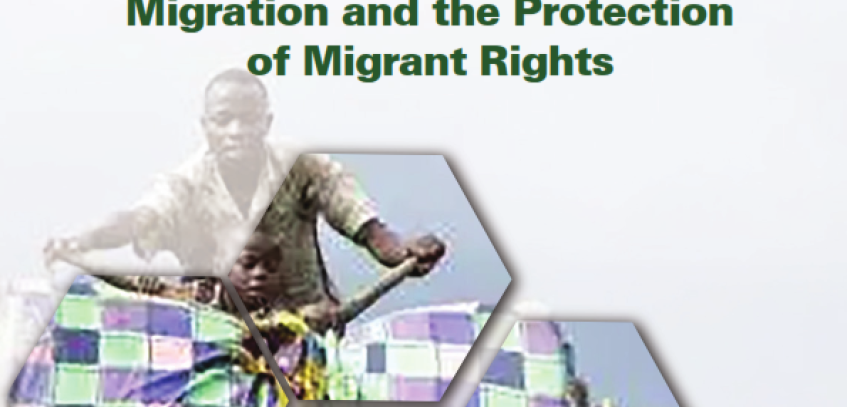2 Foreword
Africa has long been a continent of migration and mobility, with movement across international borders long providing avenues for strengthening development for the continent and also for migrants and their communities. Migration has also brought challenges and rights abuses for people moving across borders, whether temporarily or to establish new lives -- all the more for those fleeing persecution, conflict or other complex causes – as well as for States.
The preparation of the study was directed by the African Commission on Human and Peoples’ Rights in its Resolution 481 (LXVIII) 2021. It was adopted by the African Commission on Human Rights during its 75th ordinary session in Banjul, The Gambia (3-23 May 2023).
This study focuses on migration dynamics within and between different regions (North, East, Southern, Central and West) as well as extracontinentally to the African diaspora outside of Africa.
In total, the study shows the importance of and support for freedom of movement in Africa. It also shows both the broad consensus and ever-proliferating good practices for the protection of migrants’ rights – and the vital need to make the recognition and protection of those rights more widespread. In this sense, the study establishes the need for a nonbinding, soft law restatement of the rights of all African migrants that will allow the African Commission to speak authoritatively about the role of rights in the emergent free movement on the continent. The study was drafted with the technical assistance of the Migrant Rights Initiative at Cornell Law School and also benefited from the engagement at two expert meetings of representatives of academia, African continental and regional organizations, international organizations and broader civil society and including migrants – as well as members of the Commission, held in October 2022 in Banjul, The Gambia and in March 2023 online.
International migration includes the movement of refugees, asylum seekers and victims of trafficking, as well as movement across borders for reasons of family unity and/or the pull of a better economic situation – for any duration. In Africa, it prominently also includes the mobility of those whose culture and livelihoods are linked to movement, irrespective of political boundaries.
Migration on the continent involves issues of armed conflict and disaster, as well as, increasingly, climate change. The latter phenomenon will likely drive international migration trends in new ways in the years to come. As mentioned by the GCCM’s African Shifts Report, “By 2050, up to 5 percent of Africa’s population of some 2 billion people could be on the move due to climate impacts, up from 1.5 percent today”.
This study, along with regional migration trends, is situated in a robust law and policy landscape, but one in which substantial gaps remain. First, there is an increasingly significant law and policy framework supporting collaboration between African States and the leadership of the African Union (as well as the Regional Economic Communities) to establish freedom of movement, residence, and establishment on the continent.
This framework builds on longstanding continental migration dynamics, as well as inter-state dialogue processes. However, this political momentum towards greater continental mobility has identified but not filled a need to specify and affirm the rights of all migrants and create tools for state protection of those rights.
Second, there is a robust regional and international law framework providing for the rights of all migrants via the direct and indirect application of treaty law. However, there is an inadequate corpus juris, notwithstanding significant decisions by the African Commission and the African Court on Human and Peoples’ Rights touching on the rights of migrants. As this study demonstrates, important tool in this context would be nonbinding Guiding Principles that restate existing law as applied to migrants, but also reflect areas of progressive development needed to meet new challenges and incorporate the good practices identified herein.
The elaboration of this Study would not have been possible without the involvement of several peoples. To this end I would like to thank particularly the members of the Expert Consortium who participated in the preparation of this study: Dr. Marina Sharpe; Dr. Mustafa Sakr, Dr. Edwin Odhiambo Abuya , Dr. Sassi Selma Dr. Loren Landau; Mr. Álvaro Botero Navarro, Ms. Yemisrach Kebede, Mr. Abiy Ashenafi, Ms. Lou Salomé SORLIN, Ms. Ntsobo Amohelang Mamatebele Vivian, Ms.Tulai Jawara Ceesay, Ms. Delphine Perrin ,Ms. Jemina Idinoba, Mr. Stephen Matete, Mr. Abiy Ashenafi, Ms. Jemina Idinoba, Mr. Stephen Matete, Mr. Abiy Ashenafi. Jemina Idinoba, Mr. Stephen Matete, Mr. Abiy Ashenafi, Mr. Reassi Bongo-Mone Stanislas, Ms. Nneka Adaora Okechukwu and Mr. Ibrahima Kane.
Special thanks go to the editorial team: Mr Ian Kysel, Dr Luwan Dirar and Dr Fatma Raach.
And finally, to the European Union for funding this Study.
Hon. Maya Sahli-Fadel
Special Rapporteur on Refugees, Asylum Seekers, Internally Displaced Persons and Migrants in Africa
Vice-Chairperson of the African Commission on Human and Peoples’ Rights








